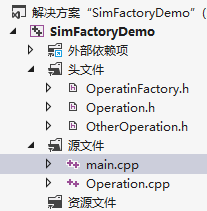版权声明:本文为博主原创文章,未经博主允许不得转载。 https://blog.csdn.net/qq78442761/article/details/84194533
继承与多态影响耦合性(最基础的简单工厂模式小实例)
原理:
通过继承和虚函数的方式修改某个子类对应函数的功能;
通过简单工厂模式到底实例化谁;
如果要增加复杂的运算只有增加响应的子类,以及工厂的分支即可;
程序运行截图如下:

目录结构如下:

源码如下:
OperationFactory.h
#pragma once
#include "Operation.h"
#include "OtherOperation.h"
#include <iostream>
#include <string>
using namespace std;
class OperationFactory{
public:
static Operation *createOperate(string operateStr){
Operation *operation;
if(operateStr == "+")
operation = new OperationAdd;
else if(operateStr == "-")
operation = new OperationSub;
else if(operateStr == "*")
operation = new OperationMul;
else if(operateStr == "/")
operation = new OperationDiv;
else
throw "The operation is wrong";
return operation;
}
};Oeration.h
#pragma once
class Operation
{
public:
double getNumberA();
double getNumberB();
void setNumberA(const double numberA);
void setNumberB(const double numberB);
virtual double getResult();
virtual ~Operation();
//protected:
double m_numberA;
double m_numberB;
};
OtherOperation.h
#pragma once
#include "Operation.h"
#include <iostream>
using namespace std;
class OperationAdd:public Operation{
public:
double getResult() override{
return m_numberA + m_numberB;
}
~OperationAdd(){
cout << "~OperationAdd called!" << endl;
}
};
class OperationSub:public Operation{
public:
double getResult() override{
return m_numberA - m_numberB;
}
~OperationSub(){
cout << "~OperationSub called!" << endl;
}
};
class OperationMul:public Operation{
public:
double getResult() override{
return m_numberA * m_numberB;
}
~OperationMul(){
cout << "~OperationMul called!" << endl;
}
};
class OperationDiv:public Operation{
public:
double getResult() override{
if(m_numberB == 0)
throw "The divisor cannot be 0";
return m_numberA / m_numberB;
}
~OperationDiv(){
cout << "~OperationDiv called!" << endl;
}
};main.cpp
#include "OperatinFactory.h"
int main(){
double num1, num2;
string operStr;
cout << "Please in put NumA:";
cin >> num1;
cout << "Please in put operation:";
cin >> operStr;
cout << "Please in put NumB:";
cin >> num2;
Operation *oper;
try{
oper = OperationFactory::createOperate(operStr);
oper->setNumberA(num1);
oper->setNumberB(num2);
cout << "The result is " << oper->getResult() << endl;
delete oper;
}
catch(const char *msg){
cout << "The error : " << msg << endl;
}
system("pause");
return 0;
}Operation.cpp
#include "Operation.h"
#include <iostream>
using namespace std;
double Operation::getNumberA()
{
return m_numberA;
}
double Operation::getNumberB()
{
return m_numberB;
}
void Operation::setNumberA(const double numberA)
{
m_numberA = numberA;
}
void Operation::setNumberB(const double numberB)
{
m_numberB = numberB;
}
double Operation::getResult()
{
return 0.0;
}
Operation::~Operation()
{
cout << "~Operation called" << endl;
}
UML类图如下:
